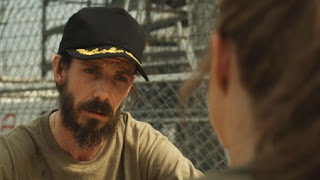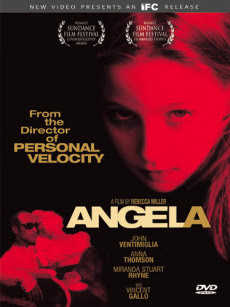If you have seen this director's previous U.S.-available effort, "The Living & the Dead," you'll know the drill- everything that can go wrong does, and his films navigate the uncomfortable grey areas of the human psyche. Being a fan of Simon Rumley's "The Living & the Dead," I decided to check it out, despite similarly mixed reviews and a nagging feeling in the back of my gut.
Boy, this film is brutal. If Rumley meant to outdo the violence of nihilistic tone of his previous movie, he succeeded. All the main characters make uniformly bad and immoral decisions, and all of them suffer for it. The movie starts out with a sleazy feel, with promiscuous Erica (Amanda Fuller) getting into bed with random strangers at a nightclub.
Then she meets Nate (Noah Taylor,) who got a honorable discharge from Iraq. Although he tips her off almost immediately that he has a history of torturing and killing animals, Erica is drawn to him, mostly because he is the first man in a long time who doesn't seem to be after sex.
The film then puts a third character into the mix, Franki (Marc Senter,) who is taking care of his sick mother Ellie (Sally Jackson. whose kind and sympathetic character reminds the viewer of Kate Fahy's Nancy in "The Living and the Dead." Franki has a rock band going with his various buds, and hates his father.
The family is thrilled when Ellie goes into remission, but tragedy lurks just around the corner, and Erica's crime has unexpected repercussions. Gandhi's advice, "An eye for an eye leaves the whole world blind," seems to apply here
Like Todd Field's "In the Bedroom," revenge only hurts those who practice it, and no one seems to get much gratification out of it (except for one, who is basically a sociopath.) But even the sociopath is capable of compassion,, which makes the dynamic between the characters all the more puzzling.
I love Rumley's style, with his moral ambiguity, interesting cinematography, and tense situations. But "Red, White, & Blue" has scenes and gaps in storytelling that make it seem less professional. The music during the torture scenes, for instance, are discordant and not in a good way, like taking bad inspiration from "Psycho."
Some scenes open awkwardly in the middle of the action, and end just as uncomfortably. An example is when Erica is almost raped by a co-worker. The beginning shot of the scene takes place in the middle of the attack, and Nate lingers for a moment before hitting the attacker with a hammer (off-screen.)
The next scene shows Nate approaching and sitting next to a teary Erica. But happened to the would-be rapist. Is he killed (and his body disposed of?) Arrested? Taken to the hospital? He disappears without a trace. There are several scenes like that, which leave the viewer rather confused.
Some of the dialogue is rather stiff and drawn out, and several lines sound alien from the way or anyone I know speak. The acting is good, however, whith unknown actors (Amanda Fuller, Marc Senter) turning in capable performances. Noah Taylor, who you may know as the teenage version of the pianist David Helfgott in the biopic "Shine," does creepy and brutal nicely. And the last scene of violence goes above and beyond over the top, amounting to one of the most disgusting things I've seen in a long time.
Should you see it? Despite panning reviews, it's not 'only an exploitation film.' Although it is a bit rough at times. it has a sense of style, and has Rumley's essential humanity, light amongst the darkness. Go see it if you have a strong stomach, and make sure to watch "The Living and the Dead" too, which has classy Gothic atmosphere and more involving, likable characters.
Boy, this film is brutal. If Rumley meant to outdo the violence of nihilistic tone of his previous movie, he succeeded. All the main characters make uniformly bad and immoral decisions, and all of them suffer for it. The movie starts out with a sleazy feel, with promiscuous Erica (Amanda Fuller) getting into bed with random strangers at a nightclub.
Then she meets Nate (Noah Taylor,) who got a honorable discharge from Iraq. Although he tips her off almost immediately that he has a history of torturing and killing animals, Erica is drawn to him, mostly because he is the first man in a long time who doesn't seem to be after sex.
The film then puts a third character into the mix, Franki (Marc Senter,) who is taking care of his sick mother Ellie (Sally Jackson. whose kind and sympathetic character reminds the viewer of Kate Fahy's Nancy in "The Living and the Dead." Franki has a rock band going with his various buds, and hates his father.
The family is thrilled when Ellie goes into remission, but tragedy lurks just around the corner, and Erica's crime has unexpected repercussions. Gandhi's advice, "An eye for an eye leaves the whole world blind," seems to apply here
Like Todd Field's "In the Bedroom," revenge only hurts those who practice it, and no one seems to get much gratification out of it (except for one, who is basically a sociopath.) But even the sociopath is capable of compassion,, which makes the dynamic between the characters all the more puzzling.
I love Rumley's style, with his moral ambiguity, interesting cinematography, and tense situations. But "Red, White, & Blue" has scenes and gaps in storytelling that make it seem less professional. The music during the torture scenes, for instance, are discordant and not in a good way, like taking bad inspiration from "Psycho."
Some scenes open awkwardly in the middle of the action, and end just as uncomfortably. An example is when Erica is almost raped by a co-worker. The beginning shot of the scene takes place in the middle of the attack, and Nate lingers for a moment before hitting the attacker with a hammer (off-screen.)
The next scene shows Nate approaching and sitting next to a teary Erica. But happened to the would-be rapist. Is he killed (and his body disposed of?) Arrested? Taken to the hospital? He disappears without a trace. There are several scenes like that, which leave the viewer rather confused.
Some of the dialogue is rather stiff and drawn out, and several lines sound alien from the way or anyone I know speak. The acting is good, however, whith unknown actors (Amanda Fuller, Marc Senter) turning in capable performances. Noah Taylor, who you may know as the teenage version of the pianist David Helfgott in the biopic "Shine," does creepy and brutal nicely. And the last scene of violence goes above and beyond over the top, amounting to one of the most disgusting things I've seen in a long time.
Should you see it? Despite panning reviews, it's not 'only an exploitation film.' Although it is a bit rough at times. it has a sense of style, and has Rumley's essential humanity, light amongst the darkness. Go see it if you have a strong stomach, and make sure to watch "The Living and the Dead" too, which has classy Gothic atmosphere and more involving, likable characters.














